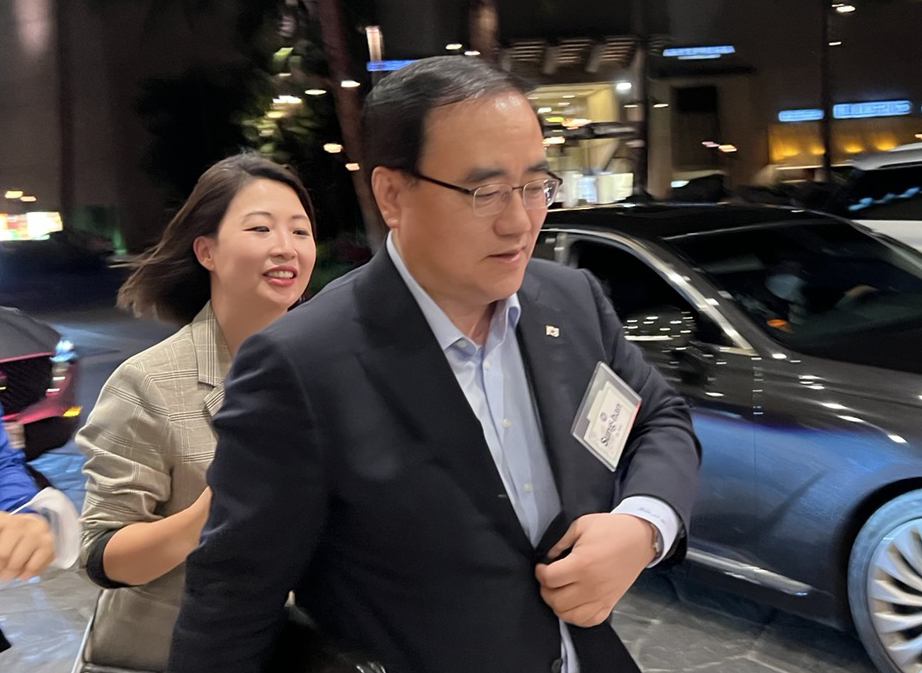
South Korea's National Security Adviser Kim Sung-han held a bilateral meeting with his US counterpart Jake Sullivan on the sidelines of a trilateral security meeting involving Japanese national security adviser Takeo Akiba in Hawaii.
"(Sullivan) said IRA does offer more of advantages than disadvantages for Korea, but also said that the US will look closely to see how the EV subsidy discussion goes, and of the impacts (IRA) would have," Kim said after his meeting with Sullivan.
The US NSC will review the impacts and explain the results of its assessment to Korea before making any administrative order.
In a previous discussion with a Korean delegation of negotiators, the US also was positive on forming an official channel with South Korea to discuss ways to minimize potential damage the new law could have on Korean firms, according to South Korean officials.
The presidential office also said Thursday that the US' new law is a topic that can be discussed in bilateral talks with Washington.
According to Deputy Trade Minister An Sung-il, who led a Korean delegation to Washington to deliver concerns over the act, the US side took their opinions seriously and responded positively on forming a new channel for discussions.
“We relayed our situation and the positions of (Korean firms), the atmosphere at the National Assembly and Korean sentiment, and the US side showed they take this matter seriously,” An said on Wednesday at the airport before returning to Seoul from his three-day trip in Washington.
The Korean government sent a delegation of negotiators, including Lee Mi-yon, director general for Bilateral Economic Affairs of the Foreign Ministry, to relay rising concerns here.
US President Joe Biden signed the IRA into law on Aug. 16. The new law, which encompasses health care, taxation and climate measures, has raised concerns in Korea’s electric vehicle industry, as it stipulates that only those vehicles assembled inside North America are qualified to receive the government’s maximum tax subsidies of $7,500.
While details have not yet been drawn out, the law would also mandate the batteries used in the vehicles not only be produced with materials imported from countries with free trade agreements with the US, but also demand that a certain percentage of the batteries be made in North America.
During the three-day trip, the delegation met with officials of the US Trade Representative and the departments of Commerce, Treasury and State, as well as the legislature.
"They (the US) were also taking this issue very seriously and were aware of our concerns. They recognized South Korea as an important ally, and they said they were prepared to continue to discuss the issue together," An said.
In their working-level meetings with the US administration and legislature, officials from White House also joined, the official explained.
A more detailed discussion on how to handle the impacts of the IRA is expected when South Korean Trade Minister Ahn Duk-keun travels to Washington to attend a meeting for the Indo-Pacific Economic Framework next week.
Korean electric-car makers have been left scrambling to deal with the fallout.
The IRA poses a serious threat to Korean automakers, including Hyundai Motor and Kia, who build their flagship electric models here and export them overseas. The companies automatically lost price competitiveness as they were excluded from the US subsidy.
Some 100,000 Korean electric vehicles for export will be affected annually by the IRA, according to an estimate from the Korea Automobile Manufacturers Association.
To minimize losses for Korean companies, time is important. But the US side maintains they need to analyze the situation first, as it has only been a couple of weeks since the law passed.
Seoul views that the US law violates the US-Korea free trade agreement, and has also considered bringing the case to the World Trade Organization for a possible violation of the “most favored nation” principle.
The Federation of Korean Industries has also sent a letter to the US president, delivering the concerns of Korean companies, it said Thursday.
The National Assembly also adopted a resolution highlighting the discriminatory nature of the US law and raised concerns on possible damages. In the plenary meeting held Thursday, 254 lawmakers out of 261 who attended the session voted in favor of the resolution.
By Jo He-rim (herim@heraldcorp.com)





